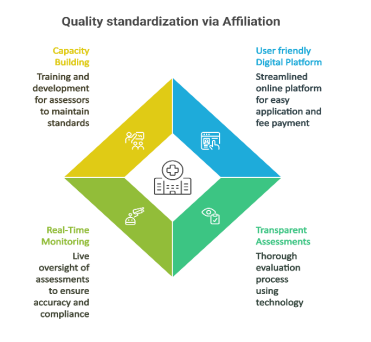Quality Standardization of Affiliation Process in Uttar Pradesh A Step Towards Service Excellence
‘Digital Governance and Transparent Assessments for Effective Affiliation Processes’
Introduction:
 The
Government of Uttar Pradesh is
committed to enhancing the state’s nursing
ecosystem. Through the State Nursing
Registration Council (SNRC)/Uttar Pradesh
State Medical Faculty (UPSMF), the affiliation
process for nursing and paramedical
institutes has been streamlined to ensure
compliance with standards in infrastructure,
faculty, curriculum and clinical training. This
initiative promotes accountability, ensures
quality education and empowers students to
obtain licensure and ultimately
strengthening healthcare delivery across the
state.
The
Government of Uttar Pradesh is
committed to enhancing the state’s nursing
ecosystem. Through the State Nursing
Registration Council (SNRC)/Uttar Pradesh
State Medical Faculty (UPSMF), the affiliation
process for nursing and paramedical
institutes has been streamlined to ensure
compliance with standards in infrastructure,
faculty, curriculum and clinical training. This
initiative promotes accountability, ensures
quality education and empowers students to
obtain licensure and ultimately
strengthening healthcare delivery across the
state.
Why Affiliation Matters:
- Validates institutions compliance with academic and operational standards
- Promotes uniformity and quality in training
- Builds a skilled and competent nursing workforce across UP
Key Highlights:
User Friendly Digital Platform for Simplified Application Process
- Structured online forms for all components
- Separate pathways for new and old applicants
Transparent and Fair Assessment
- 150 trained assessors (Nursing/Paramedical)
- 3 member team using body cams and surprise assessors
Real-Time Remote Monitoring
- Real-time tracking by SNRC/UPSMF
- Surveillance tools for evidence capture
Capacity Building for assessors
- Mandatory training on tools and ethics
- Centralize database for governance
Results at a Glance:
| Metrics | Result 2023-2024 | Result 2024-25 |
|---|---|---|
| Institutes applied | ~500 | ~1100 |
| Institutes granted affiliation | 16% | 11% |
| Assessors deployed per institute | 3 (2 technical and 1 non- technical) | 3 (2 technical and 1 non- technical) |
Key advancements achieved in streamlining affiliation process:
- To minimize bias and ensure objectivity, assessment conducted by Certified National Accreditation Body via assessors from institutes outside Uttar Pradesh were deployed
- The shift to an online portal application processing, assessment, scheduling and reporting, reducing manual errors and enabling real-time tracking
- Live streaming of assessment monitored centrally, with video evidence captured and stored instantly, reinforcing accountability and enabling evidence-based decision making
Impact of the Reform:
Quality Assurance
- The process enforces quality standards in teaching and hostel infrastructure, hospital functionality and statutory documentation ensuring quality standardization.
Transparency & Accountability
- Utilizing body cameras and remote monitoring during assessments has strengthened public confidence. A consistent, objective evaluation framework is applied across all assessments to ensure fairness and transparency.
Efficient Governance
- The adoption of digital applications has helped eliminate administrative backlogs and improve the efficiency of decision-making. Coordination between SNRC/UPSMF, the Certified National Accreditation Body, and partner organizations has enhanced overall governance.
Upholding High Standards
- In 2024-25, ~11% institutions met the quality standards through comprehensive evaluation, emphasizing the state’s commitment to maintaining excellence in health education.





